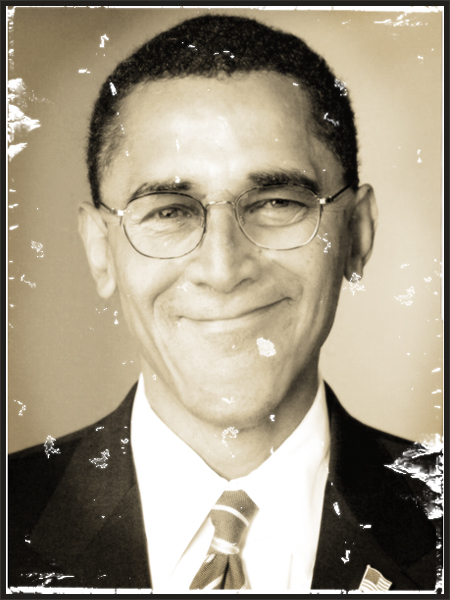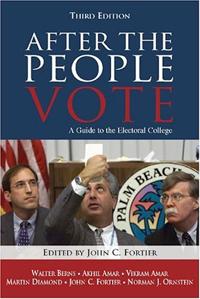 Why does the United States, champion of democracy, have a drawn-out presidential electoral system that is a far cry from the "one vote for all" principle?
Why does the United States, champion of democracy, have a drawn-out presidential electoral system that is a far cry from the "one vote for all" principle?As the Iowa caucuses and the impending New Hampshire primary remind us, there's one prediction that can be ventured with almost absolute certainty: in early November 2008, the United States will have selected its next president.
This must be so, because in the aftermath of Franklin Roosevelt's unprecedented four electoral triumphs, the Senate passed a constitutional amendment in 1947, prohibiting any future president from serving more than two full terms in the White House.
So George W Bush cannot stand for re-election again. And not only will he not be running again, nor will his deputy Dick Cheney, who doesn't wish to gain the presidency himself. Which means there'll be neither an incumbent president nor an incumbent vice-president seeking re-election this autumn - something that hasn't happened in the US for more than half a century.
But when I say that it's almost certain that the US will have selected a new president this November, I choose my words with particular care. For while it's virtually assured that this will happen, neither the outcome nor the timing can be guaranteed.
The presidential election of 2000 took place, as required by the constitution, early in November; but for weeks, the result remained in doubt, and George W Bush was not declared the winner until early January 2001, nearly two months later.
And I didn't say that the American people will elect their president, because collectively they do no such thing: for the popular ballot in each state is converted into a delegated franchise in an institution called the Electoral College, and it's the members of the college, whose numbers reflect the combined representation of each state in both houses of Congress, who actually vote for one or other of the candidates.
Because of the uneven distribution of the US population, this means a presidential contender can actually lose the popular vote across the whole nation, but can still win the Electoral College, as George Bush himself did in 2000, and as Benjamin Harrison did in 1888, and as Rutherford B Hayes had done 12 years before that.
Democracy, with strings
The US may have good reason to pride itself on being the world's oldest continually functioning democracy, and spreading freedom around the world has been one of George Bush's most cherished (and most thwarted) ambitions.
"The founding fathers built in checks and balances to prevent democracy from getting out of hand"
But it's certainly not a democracy in the sense that most of us would understand that term, when it comes to selecting - rather than electing - a president, and it was never intended that it should be.
When the founding fathers created their constitution, in the aftermath of the American War of Independence, they sought to modify the prevailing revolutionary and libertarian mood by building in checks and balances to prevent democracy from getting out of hand.
 One way of doing this was to require that senators should be elected to Congress for six years, thereby rendering them free of popular pressure for most of their turn. Another was to create the Electoral College, which meant that the president would be chosen indirectly rather than by the American people as a whole.
One way of doing this was to require that senators should be elected to Congress for six years, thereby rendering them free of popular pressure for most of their turn. Another was to create the Electoral College, which meant that the president would be chosen indirectly rather than by the American people as a whole.From this side of the Atlantic, these roundabout and arcane processes of choosing a leader seem mildly reminiscent of electing the Holy Roman emperor in medieval and early modern Europe, and of the way in which popes are still decided on by the College of Cardinals to this day.
And even if everything turns out to be consistent and straightforward, in terms of both the popular mandate and the electoral college vote, then the successful presidential candidate, whoever he - or she - may be, doesn't take office immediately, in the way that one prime minister can instantly succeed another after a general election in Britain, as Tony Blair did when he ousted John Major from 10 Downing Street on 1 May 1997.
Who's in charge
Instead, there'll be a period of what is known as transition, lasting until the third week of January, when the new president will be inaugurated and finally take up residence in the White House.
Ten weeks may seem a long time for such a handover; but until Franklin Roosevelt's day, this transition went at an even more leisurely pace. Roosevelt was elected in November 1932, but he wasn't inaugurated until March 1933. It was only with his re-election four years later that the inauguration was brought forward to the following January - in so doing, Roosevelt established a precedent that has been followed by all US presidents since.
When John F Kennedy was inaugurated in January 1961, he observed that such state ceremonials, taking place in Washington on the steps of the Capitol, and surrounded by the great and the good, were not so much a victory of a political party as a celebration of national freedom.
Yet this was scarcely the whole truth of things, since Kennedy's presidential triumph was also a significant party triumph for the Democrats, and the voting irregularities which had taken place in Mayor Daly's Chicago, and which had helped Kennedy to win the key state of Illinois, were scarcely consistent with the claim that Americans were a free people, or that theirs was an unfettered democracy.
And Kennedy neglected to mention something that may have been self-evident on his side of the Atlantic, but which wasn't at all obvious here: that the inauguration of a new president is more akin to the British coronation of a new head of state than to a general election which may result in a new prime minister.
However partisan and divisive the election campaign may have been, the president is expected, on taking office, to rise above such sectional interests, and get beyond such partisan bickering, and to assume the august mantle of national leader, embodying and personifying the goodness and the greatness of the American people as a whole.
This in turn helps explain why White House scandals are so riveting yet so traumatic for the US political classes and for the American people. As politicians seeking the highest office, presidential candidates may be uninspiring, fallible, wayward, even corrupt human beings; yet once they are inaugurated, they are expected to shed these mortal shortcomings and moral imperfections, and to be transformed into exemplary national paragons.
That was what made the Watergate affair and the ensuing destruction and disgrace of Richard Nixon so wrenching for so many Americans: it was not so much as if the then British prime minister, Edward Heath, had been caught trying to subvert the constitution, but rather as if Queen Elizabeth II herself had been found out doing something equally dreadful.
Imagine the ensuing trauma, with Her Majesty forced to abdicate and to go into exile, as had been the case with her uncle, King Edward VIII, when he renounced the throne in 1936. That conveys some sense of what it meant to Americans to see their president resign in disgrace.
Dignified and efficient
One of the ways in which the American presidency is unusual is that it combines both the ceremonial and the executive functions of national leadership - functions which, here in Britain, are divided between the monarch (as head of state) and the prime minister (as chief executive).
In the middle of the 19th Century, Walter Bagehot, who for much of his life was a journalist on the staff of The Economist, and who had a fine flair for a memorable phrase, drew attention to this contrast by noting the distinction between what he described as the "dignified" and the "efficient" elements of the British constitution.
The "dignified" part was, of course, the monarch (with some help from the royal family and the House of Lords). The "efficient" part was the prime minister (along with the cabinet and the House of Commons). No doubt Bagehot over-simplified, but it was an arresting formulation, it has (if anything) become more true since his own time, and it describes a way of doing things which has been widely replicated elsewhere in British life, whereas it is relatively rare in the US.
Here is one obvious contrast: British universities have both a chancellor, who dresses up for degree days, and a vice-chancellor, who actually runs the place. In US universities, both jobs are performed by the same person who, once again, is known as the president. Here is another: while British museums and galleries and foundations tend to have both a chairman of trustees and also a director who is the chief administrator, both jobs tend to be combined in the US in the person (surprise surprise) of the president.
So, to put it in Bagehot's terms, while our monarch is expected to be dignified, and our prime minister is supposed to be efficient, American presidents are required to be both dignified and efficient at the same time, and so, by extension, are American presidential candidates. I wonder by which of these two very different attributes the inhabitants of Iowa and New Hampshire have been more impressed in recent weeks?

No comments:
Post a Comment